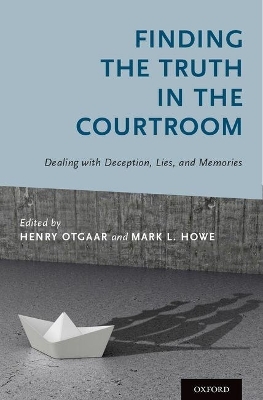
Finding the Truth in the Courtroom
Oxford University Press Inc (Verlag)
978-0-19-061201-6 (ISBN)
In many criminal trials, forensic technical evidence is lacking and triers of fact must rely on the reliability of eyewitness statements, identifications, and testimony; however, such reports can be riddled with deceptive statements or erroneous recollections. Based on such considerations, the question arises as to how one should weigh such eyewitness accounts given the theoretical and empirical knowledge in this field. Finding the Truth in the Courtroom focuses on how legal professionals, legal/forensic psychologists, and memory researchers can decide when statements or identifications are based on truthful or fabricated experiences and whether one can distinguish between lies, deception, and false memories.
The contributors, key experts in the field, assemble recent experimental work and case studies in which deception or false memory plays a dominant role. Topics discussed relate to the susceptibility to suggestive pressure (e.g., "Under which circumstances are children or adults the most vulnerable to suggestion?"), the fabrication of symptoms (e.g., "How to detect whether PTSD symptoms are malingered?"), and the detection of deceit (e.g., "Which paradigms are promising in deception detection?"), among others. By using this approach, this volume unites diverse streams of research (i.e., deception, malingering, false memory) that are involved in the reliability of eyewitness statements.
Henry Otgaar works as Assistant Professor at the Forensic Psychology section, Faculty of Psychology and Neuroscience, Maastricht University. His research expertise revolves around issues such as the development of memory, false memory, the link between trauma, memory, and psychopathology, and memory in the legal area. He has published numerous peer-reviewed articles, book chapters, and books on memory (e.g., What Is Adaptive About Adaptive Memory?, OUP 2014). He has received many (inter)national awards for his research such as the Edmond Hustinx Science Award and the Early Career Excellence Award. He also works as an expert witness for the Maastricht Forensic Institute and is an associate editor for Memory and a co-editor for In-Mind. Mark L. Howe holds a Chair in Cognitive Science at City, University of London. His over 35 years of research on memory has addressed questions concerning memory development, memory illusions, the adaptive functions of memory, links between reasoning and memory, memory in traumatized and maltreated children, as well as memory and the law. He has published numerous peer-reviewed articles, book chapters, and books on memory development (e.g., The Nature of Early Memory, OUP 2011) and memory and the law (e.g., Memory and Miscarriages of Justice, 2017). In addition to editing a variety of books (e.g., Stress, Trauma, and Children's Memory Development, OUP 2008; What Is Adaptive About Adaptive Memory?, OUP 2014), he is the Associate Editor of Developmental Review and an Editor-in-Chief for Memory.
About the Editors
Contributors
Chapter 1: Deception and Memory in the Courtroom: An Overview
Henry Otgaar and Mark L. Howe
Part I: Memory in the Courtroom
Chapter 2: Misinformation in the Courtroom
Shari R. Berkowitz and Elizabeth F. Loftus
Chapter 3: Suggestibility in the Courtroom: How Memory Can Be Distorted During the Investigative and Legal Process
Fiona Gabbert and Lorraine Hope
Chapter 4: When Spontaneous Statements Should Not Be Trusted: False Memories in Children and Adults
Henry Otgaar and Mark L. Howe
Chapter 5: A Neurobiological Account False Memories
Vincent van de Ven, Henry Otgaar, and Mark L. Howe
Part II: Children in the Courtroom
Chapter 6: Assessing the Veracity of Children's Forensic Interviews: Implications for the Courtroom
Hayden M. Henderson and Samantha J. Andrews
Chapter 7: Putting Children's Memory and Suggestibility in their Place: An Analysis Considering Person, Topic, and Context
Deborah Goldfarb, Gail S. Goodman, Rakel P. Larson, Alejandra Gonzalez, and Mitchell L. Eisen
Part III: Deception in the Courtroom
Chapter 8: Nonverbal Detection of Deception
Aldert Vrij
Chapter 9: Building a Case: The Role of Empirically Based Interviewing Techniques in Case Construction
Timothy J. Luke, Maria Hartwig, Laure Brimbal, and Pär Anders Granhag
Chapter 10: Deception Detection Using Psychophysiological and Neural Measures
Ewout H. Meijer and Bruno Verschuere
Part IV: Malingering in the Courtroom
Chapter 11: Seven Myths About Feigning
Marko Jelicic, Harald Merckelbach, and Irena Boskovi
Chapter 12: False Symptom Claims and Symptom Validity Assessment
Thomas Merten
Index
| Erscheinungsdatum | 18.11.2017 |
|---|---|
| Verlagsort | New York |
| Sprache | englisch |
| Maße | 155 x 239 mm |
| Gewicht | 567 g |
| Themenwelt | Geisteswissenschaften ► Psychologie ► Allgemeine Psychologie |
| Geisteswissenschaften ► Psychologie ► Biopsychologie / Neurowissenschaften | |
| Geisteswissenschaften ► Psychologie ► Verhaltenstherapie | |
| Recht / Steuern ► EU / Internationales Recht | |
| Recht / Steuern ► Strafrecht ► Kriminologie | |
| Recht / Steuern ► Strafrecht ► Strafverfahrensrecht | |
| ISBN-10 | 0-19-061201-0 / 0190612010 |
| ISBN-13 | 978-0-19-061201-6 / 9780190612016 |
| Zustand | Neuware |
| Haben Sie eine Frage zum Produkt? |
aus dem Bereich


